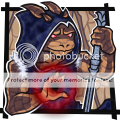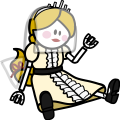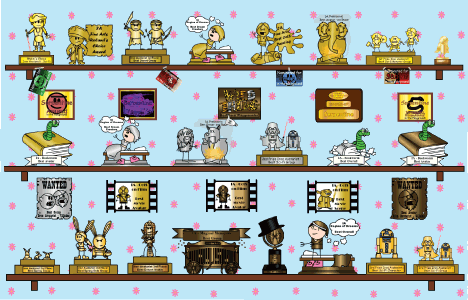Results 1 to 14 of 14
Thread: Universal Deities
-
2014-08-29, 03:46 PM (ISO 8601)Dwarf in the Playground


- Join Date
- Dec 2010
 Universal Deities
Universal Deities
I'm presently working on the setting for a 3.5 campaign I'm going to be running irregularly for who knows how long, and probably the setting I'm going to be using for a majority of my 3.5 campaigns. One of the things I'm trying to do is get away from the 'universal pantheon' that standard D&D settings go for (I realize the thread title seems anachronistic at the moment), so instead I'm creating different cultural and religious groups that all have their own religious traditions, pantheons, and so forth, with all the associated sharing of religious and cultural tradition that tends to happen between neighbours in the real world. There ARE actually Gods in this setting, but with a single major exception, they refuse to interact with the human world except in times of extreme need and instead leave them to speculate. This divine non-interference dogma is what allows culture to continue to question the nature of the divine, if you will.
But what I'm asking isn't directly tied in to my setting. I'm asking about universal TYPES of deities - the sorts you should see cropping up in most pantheons in some form or another unless there are other circumstances (like, say, a monotheism). What do you think these universal portfolios are?
The ones I've got so far are:
Farming/the Harvest/specific important crops (Maize, Wheat, Rice, etc.)
Solar deities (Sun and Moon, Night and Day, etc.)
Seasonal deities (perhaps less universal and could be a subset of the above, but)
I'd also argue that family and fertility are probably also common spheres, but I dunno that they're actually universal.
What do you think? What else should show up unless there's an explanation to the contrary?
-
2014-08-29, 06:14 PM (ISO 8601)Ogre in the Playground


- Join Date
- Sep 2013
 Re: Universal Deities
Re: Universal Deities
Trickery
War (however it's a lot more fun to break this down into aspects, since wars always has at least two conflicting sides)
Craft/Creation
Elemental (Air/Sky, Water, Fire, Earth)
I cannot say if there is a universal Death or Destruction deity, but that fits well as a balance to Fertility and Life.
-
2014-08-29, 06:41 PM (ISO 8601)Titan in the Playground


- Join Date
- Aug 2009
- Location
- Erutnevda
 Re: Universal Deities
Re: Universal Deities
- Sky
- Fertility
- Death
- Ingenuity/Craftsmanship
- Sun
- Moon
- Arts
- War
- Sea
- Law
These all are universal to my knowledge. Sometimes they're put together in one deity and there will usually be multiple Fertility gods and War gods (and often these two are not mutually exclusive, especially for goddesses), if not multiples for many of these portfolios. I'd say if you can get your hands on it, leaf through the 2e Legends and Lore they showed their work at least with the ones I'm familiar with.Last edited by Zaydos; 2014-08-29 at 06:41 PM.
Peanut Half-Dragon Necromancer by Kurien.
Current Projects:
Group: The Harrowing Halloween Harvest of Horror Part 2
Personal Silliness: Vote what Soulknife "Fix"/Inspired Class Should I make??? Past Work Expansion Caricatures.
Old: My homebrew (updated 9/9)
-
2014-08-29, 07:06 PM (ISO 8601)Bugbear in the Playground

- Join Date
- Aug 2014
- Location
- ???
- Gender

 Re: Universal Deities
Re: Universal Deities
Cycles, balance, and duality are common themes in many cultures. Life opposing Death, War opposing Peace, Fire opposing Water, etc. Dual-faced gods and goddesses, balance of good and evil, that sort of thing.
Some kind of word-witch. She/her. Find more of my stuff at my new website!
-
2014-08-30, 10:16 AM (ISO 8601)Bugbear in the Playground


- Join Date
- Mar 2013
- Gender

 Re: Universal Deities
Re: Universal Deities
Those mentioned above are the ones I most often hear about in the rather classical pantheons. But then, if you want diverse pantheons of gods for people with different religions, I would think about some other divine beings, rather than gods representing something.
I would like to point out there are some other concepts that get deified (is that even a word?). Primal forces such as time and chaos (sometimes creating the actual gods by clashing - think Chaos and Gaia). The "reborn son" gets a role often too (think Mithras, Jesus, Osiris). In a lot of modern day spiritualities there are people almost worshipping the Self, Humanity, Harmony, mindfulness. And then of course there are the animals (Raven, Dragons, Quetzalcoatl).
And especially if the gods don't intervene too much, I wouldn't be surprised if there would be a large group of non-believers; atheism is almost as universal as the classic pantheons.
-
2014-08-30, 04:07 PM (ISO 8601)Banned

- Join Date
- Aug 2014
- Gender

 Re: Universal Deities
Re: Universal Deities
Here some more:
-Healing
-Purification
-Sex
-Marriage
-Animals
-Magic
-Desert
-Justice
-Thunder
-Sky
-Animal gods (The rat god, the snake god and so on)
-Death
-Day
-Nigth
-Darkness
-Life
-Undeath
-Knowledge
-Agriculture
-Love
-Freedom
-Slavement
-Slavery
-Law
-Chaos
Hope that helped.
-
2014-08-30, 04:43 PM (ISO 8601)Ogre in the Playground


- Join Date
- Jul 2012
- Location
- Across the spiraling sea.
 Re: Universal Deities
Re: Universal Deities
I'd argue that the classical elements aren't really a universal constant when it comes to deities. Even in Greece, where the idea flourished the most, they didn't have gods specifically of water, air, fire, and earth. Rather, they had a god of the sea, of the sky, of the forge (and by extension, hearth), and no real god of the Earth, because the Earth itself was a living being and itself the mother of all things. While its conceivable that there could be gods of the elements, they would probably not be universal, or they would fall under the purview of an instantly recognizable aspect of nature. Addendum: the ocean is not a universal aspect of nature, there could be a great many tribes of people who live far from the sea, and would thus have no concept of seemingly unending bodies of water.
I do agree that Trickery is a very common trope however, some examples being the Coyote in Native American Myth, the Raven of the Pacific, Anansi the Spider in Africa, and, of course, Loki. Many would also consider Hermes to be a trickster god, alongside Eris, the goddess of chaos. One very interesting thing to take away is that the trickster is usually male, and usually works to the benefit of mortals, rather than just themselves.
-
2014-08-30, 05:42 PM (ISO 8601)Ogre in the Playground


- Join Date
- Sep 2013
 Re: Universal Deities
Re: Universal Deities
I will admit I mistyped when I had elemental deities. I was thinking in terms of what they controlled, such as the seas, volcanoes, and the heavens.
And although the trickster is usually male, I think that is a tie over from a male dominant society. Tricksters also have an interesting ability in that they usually can change their gender at will.
-
2014-08-31, 11:27 PM (ISO 8601)Colossus in the Playground

- Join Date
- Jun 2006
- Location
- Dinosaur Museum aw yisss.
- Gender

 Re: Universal Deities
Re: Universal Deities
I used this same concept in my campaign world. Keeping in mind that I was restricting myself to 9 of them, the ones I settled on (and some of the concepts they incorporated) were:
- Father: creation, protection, strength, masculinity, solar
- Mother: creation, protection, birth, fertility, femininity, lunar
- Time: death, endings, beginnings, renewal, the afterlife, cycles
- Trickster: anarchy, change, underhandedness, deception
- Nature: earth, fecundity, animals, plants, health, agriculture
- Knowledge: information, intellect, magic, secrets, science
- Love: romance, sex, friendship, jealousy, obsession, beauty
- Creativity: technology, art, music, literature, invention, progress
- Violence: war, murder, destruction, bloodlust, insanityThe Iron Avatarist Hall of Fame!
Prizes(Un)Official Best Playground Avatarist Competition
----
Also, buy my stuff! T-Shirts too!

-
2014-09-02, 10:27 AM (ISO 8601)Bugbear in the Playground


- Join Date
- Jun 2013
- Location
- Howard, NY
- Gender

 Re: Universal Deities
Re: Universal Deities
I try to keep to answering the original question: what are some universal deity archetypes? But I don't think there are any, or at any rate very few. Some are near universal. What's universally true is that the gods of a culture mostly represent what is important in that culture. A bunch of near universals have been named, and some of the stuff named I would not think are as near universal as others. I'm not sure my own list of the near universals will really add much to the discussion, but what the heck?
- Creation (There's a creation myth, which may involve a god who's still around or one who has been replaced.)
- Head of the gods
- God of law/law giver (maybe the same as the head of the gods)
- Sun
- Moon
- Sea
- War
- Death/afterlife
- Fertility of the land
- Fertility of mothers (maybe the same as above, if not then flip a coin for who gets livestock)
- Weather (or multipel for aspects of weather)
- Trickery
Common and good stuff to consider, but maybe not as near universal as above would include
- Love (or mnltiples for romance, sex, etc.)
- Sky
- Home
- Domestic crafts (could extend to major building and/or arts)
- Knowledge
- Healing/medicine
- Luck
- Nature/winderness (likely many)
- Magic
- Evil
I guess it goes without saying (or would, if I weren't about to say it) that any of these might have multiple gods or be combined two or more at a time under one god, depending on the importance within the specific society.-- Joe“Shared pain is diminished. Shared joy is increased.”-- Spider RoninsonAnd shared laughter is magical
Always remember that anything posted on the internet is, in a practical if not a legal sense, in the public domain.
You are completely welcome to use anything I post here, or I wouldn't post it.
-
2014-09-02, 02:38 PM (ISO 8601)Pixie in the Playground


- Join Date
- Jul 2014
 Re: Universal Deities
Re: Universal Deities
[QUOTE=Cdr.Fallout;18029810]I'd argue that the classical elements aren't really a universal constant when it comes to deities. Even in Greece, where the idea flourished the most, they didn't have gods specifically of water, air, fire, and earth. Rather, they had a god of the sea, of the sky, of the forge (and by extension, hearth), and no real god of the Earth, because the Earth itself was a living being and itself the mother of all things. While its conceivable that there could be gods of the elements, they would probably not be universal, or they would fall under the purview of an instantly recognizable aspect of nature. Addendum: the ocean is not a universal aspect of nature, there could be a great many tribes of people who live far from the sea, and would thus have no concept of seemingly unending bodies of water.
QUOTE]
The Greeks actually had a specific goddess of the hearth. Also, the elemental domain was more specifically reigned over by the Titans as oppossed to gods. These elemental forces spawned the gods, and then where defeated by them.
Historically, many religions from people groups located far away from the ocean viewed the ocean as Chaotic and Evil. See specifically ancient Babylonian, Sumerian, Assyrian, and Hebrew beliefs. Tiamat (or Tehome in Hebrew) is envisioned as the watery depths, or a sea serpent who is almost always in these mythologies fought and killed by some supreme divine storm god. Most of these beliefs have the earth created out of the body of the slain goddess. i.e. Marduk kills Tiamat and creates the earth from her body, the old testament god of the hebrews "kills" Tahome (darkness) by speaking and creating life (incidently he ends up with a pet sea serpent or kills it depending on where in scripture you want to read, Job versus Psalms).
Also, a lot of these ancient deities fulfill multiple roles. Ancient Near Eastern storm gods where frequently gods of Storms, War, and Fertillity all at the same time. They were storm gods as storms were the most dangerous and powerful manifestations of nature they were exposed to. This is also why they were war gods. Storms represented power. Rain, a byproduct of being a storm god, lent itself to being a fertillity cult as the rain "fertilizes" the ground and produces crops. Thus, both Yahweh (my apologies to Jewish readers) and Baal are both represented as storm and war gods, Baal is also historically a fertility god. The story of Elijah and the prophets of Baal in scripture is hilarious because Elijah is proving not only Baal's powerlessness but his sexual impotence in his inability to provide rain.
-
2014-09-02, 06:09 PM (ISO 8601)Bugbear in the Playground


- Join Date
- Jun 2013
- Location
- Howard, NY
- Gender

-- Joe“Shared pain is diminished. Shared joy is increased.”-- Spider RoninsonAnd shared laughter is magical
Always remember that anything posted on the internet is, in a practical if not a legal sense, in the public domain.
You are completely welcome to use anything I post here, or I wouldn't post it.
-
2014-09-02, 11:03 PM (ISO 8601)Dwarf in the Playground


- Join Date
- Aug 2014
- Location
- Grand Rapids, MI
- Gender

 Re: Universal Deities
Re: Universal Deities
Aside from a misunderstanding of Hebrew beliefs (the example stated is closer to what the writer of the Epic of Gilgamesh believed and that was of Sumerian origin), the poster two above this one had a valid point. Geography does tend to form historic humanity's views on the moral alignment of 'deities'. The same should apply in fantasy. For example in one of my own settings a pseudo-Egyptian style desert civilization views the 'god' of the mountains as their protector. They believe this b/c the mountains act as a barrier keeping out invaders. In the same setting a pseudo-Greco-Roman civilization sees their 'god' of the mountains as dangerous and angry. They have this perspective b/c raiders often come from the mountains and their mountain range is volcanic in nature.
-Curb
-
2014-09-02, 11:16 PM (ISO 8601)Dwarf in the Playground


- Join Date
- Aug 2014
- Location
- Grand Rapids, MI
- Gender

 Re: Universal Deities
Re: Universal Deities
Beyond that, particularly powerful natural occurrences and life events seem to have been the focus for most pantheons. Several useful lists can be seen above. Additionally it is noteworthy that most have an opposite, though not necessarily equal counterpart. Sun and Moon, Birth and Death, Fire and Storm/Water.
If you go far enough back for humanity's oldest religions most start with a Creator-deity and then the rest of the 'gods' spawn. This is true of the Canaanites, Phoenicians, Sumerians, Greeks, Norse, Persians, and the Egyptians. In the case of the Hebrews, and to an extent the Persians, they stuck with the Creator-deity. I have personally read the oldest material from these religions that is still extant in part b/c I just love history and in part b/c I wanted inspiration for setting design in D&D. This theme is present in most of them. Just a thought.Last edited by Curbstomp; 2014-09-02 at 11:21 PM.
-Curb




 Reply With Quote
Reply With Quote







 RSS Feeds:
RSS Feeds: 

